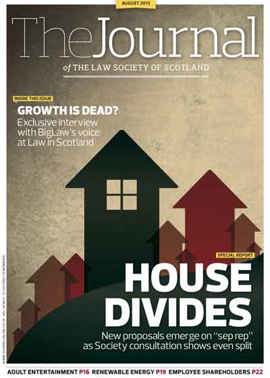One year, and counting?

Client relations managers have recently received from the Society changes to the Scottish Legal Complaints Commission’s rules on time limits for submitting complaints, in a new rule 4(6) in the SLCC’s rules.
The previous (2009) version said: “A complaint will not be accepted (unless the Commission considers that the circumstances are exceptional) if it is made more than one year after the professional misconduct, unsatisfactory professional conduct or conviction suggested by it appears to have occurred, or the professional services suggested by it to have been inadequate appear to have been provided”.
The good news is that in relation to conduct and third party IPS complaints, where there must in any event have been IPS to the solicitor’s own client, the one year rule remains as previously stated. The change in the rule is apparently necessary to clarify the position in relation to complaints of IPS by clients of their solicitor.
In this respect the rule (www.scottishlegalcomplaints.org.uk/media/46190/slcc_rules_2013.pdf) now provides that a service complaint “will not be accepted if, in the opinion of the Commission, the complaint is made more than one year after the date on which any services in respect of that matter were last provided to that client”. Previously, the Commission’s policy arguably contradicted its own rules by using that date, rather than the date on which the client knew they had grounds to complain.
If a complaint is made to the Commission, it is axiomatic to the trained lawyer that he or she should enquire as to whether or not it was timeously made. The new rule applies to complaints received on or after 3 June 2013.
Anomalous effects?
This may not appear at first blush to be terribly dramatic, but practitioners should consider the following not unusual scenarios when considering “service ending”:
- Firm A and firm B act in the purchase of adjacent identical houses in a new-build estate. This is a first registration and it takes three years. After two and a half years, the Keeper makes a requisition of firm A relative to the whole estate. Firm A deals with it. The land certificate is issued after three years. Firm A sends a copy to its client as part of its service to confirm registration. Firm B does not. Firm A’s client has a lender and titles are sent to it. Firm B’s client has no lender. Complaints against firm A will be time barred three years later than complaints against firm B, for a virtually identical task.
- Mrs D dies leaving the liferent of her estate to her second husband, the executor’s stepfather, who wishes to complain of IPS because of delay in realising volatile investments, resulting in loss. The time bar date is different in the following scenarios: The liferenter dies shortly afterwards during the administration period, which due to foreign estate and inheritance tax challenges takes three years to wind up. The liferenter survives for 20 years and the estate is not wound up until he dies. The liferenter dies early in the administration period, and the estate is wound up a year after the first death.
- Client E is represented by firm F. He pays a fixed amount each month towards his fees, on the understanding that when the matrimonial home is sold, any outstanding balance will be paid. The last contact with the client was on 30 September. The client grants a trust deed for creditors in November, and the firm writes to the court withdrawing from acting in December. E complains that monthly fees were understated and contributed to his insolvency. In this case, while there is no doubt that withdrawing ends the services, the client by becoming insolvent breaches the terms of engagement in November, and has in fact received no service since September. The following October he makes a complaint. When did service end?
Essential terms of business
It clearly is more important than ever that terms of business be written as tightly as possible. In the above examples, (1) it should be made clear that service ends to the client on registration of the title in their favour, and to the lender on recording of the standard security; (2) executry terms of business should make it clear that administration of a liferent trust is a separate matter following the ingathering of the estate; and (3) where instructions are sought but not received, the last date of service is the date of the request for instructions.
Separate matter numbers should be opened in practice management systems, and separate terms of business issued, in cases where there is a continuation of a previous matter, e.g. an appeal.
Firms should check their terms of business to ensure that in addition to complying with rule B4, it is clear where a separate matter is in operation. One might think that where there was a separate application for advice and assistance or legal aid this would automatically be a separate matter, but again taking care and reissuing fresh terms of business for each matter is advised.
In this issue
- Widening access to the stocks and gallows?
- Family migration revisited
- The same but different
- Controlling tendency
- ESPC: out of the parental home
- Offshore employment: floating goalposts?
- Reading for pleasure
- Opinion column: David O'Hagan
- Book reviews
- Profile
- President's column
- Make the most of your "multiples"
- Sep rep: all to play for
- The bigger they are...
- Licensed to thrill
- Capacity challenge
- One year, and counting?
- Selling your rights... for what?
- The voice of technology
- A serious matter
- Relocation: where are we now?
- Whistle for reform
- Same sex marriage: for richer, for poorer
- Scottish Solicitors' Discipline Tribunal
- Residential property review takes shape
- In-house lawyers seek a rising star
- Mentoring: the way forward
- How not to win business: a guide for professionals
- Comm prop risks
- Ask Ash
- Crossed purposes
- Conference looks for profession to evolve
- Law reform roundup
- Help with the red flags






